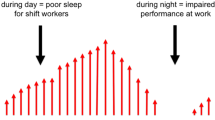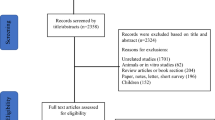Abstract
Purpose of Review
To systematically review the available research studies that characterize the benefits, uncertainty, or weaknesses of commercially available sleep-tracking technology.
Recent Findings
Sleep is a vital component of health and well-being. Research shows that tracking sleep using commercially available sleep-tracking technology (e.g., wearable or smartphone-based) is increasingly popular in the general population.
Methods
Systematic literature searches were conducted using PubMed/Medline, Embase (Ovid) the Cochrane Library, PsycINFO (Ovid), CINAHL, and Web of Science Plus (which included results from BIOSIS Citation Index, InSpec, and Food, Science and Technology Abstracts) (n = 842).
Study Inclusion and Exclusion Criteria
Three independent reviewers reviewed eligible articles that administered a commercially available sleep tracker to participants and reported on sleep parameters as captured by the tracker, including either sleep duration or quality. Eligible articles had to include sleep data from users for > = 4 nights.
Summary
Seven articles met criteria for review. A wearable sleep tracker (e.g., wrist-based) was utilized to track sleep in five of the seven studies, a smartphone-based sleep tracker app was used to record sleep in two of the seven studies. Studies in this review may be characterized in several broad categories, including studies that examined: (1) sleep before and after a clinical procedure (e.g., surgery) (two studies); (2) sleep and a health-related outcome (e.g., asthma symptoms (two studies); (3) the relationship between sleep tracker data and self-reported sleep (one study); and (4) sleep tracker data before and after major political events (one study). Among the studies examining sleep tracker data and health-related outcomes, sleep tracker data was associated with health outcomes, including asthma symptoms, blood pressure, and mood.

Similar content being viewed by others
References
Papers of particular interest, published recently, have been highlighted as: • Of importance
Jean-Louis G, Kripke DF, Ancoli-Israel S. Sleep and quality of well-being. Sleep. 2000;23:1115–21.
Watson NF, Badr MS, Belenky G, Bliwise DL, Buxton OM, Buysse D, et al. Joint consensus statement of the American Academy of Sleep Medicine and Sleep Research Society on the recommended amount of sleep for a healthy adult: methodology and discussion. Sleep. 2015;38:1161–83. https://doi.org/10.5665/sleep.4886.
Hirshkowitz M, Whiton K, Albert SM, Alessi C, Bruni O, DonCarlos L, et al. National Sleep Foundation’s sleep time duration recommendations: methodology and results summary. Sleep Health J Natl Sleep Found. 2015;1:40–3. https://doi.org/10.1016/j.sleh.2014.12.010.
Liu Y, Wheaton AG, Chapman DP, Cunningham TJ, Lu H, Croft JB. Prevalence of healthy sleep duration among adults — United States, 2014. MMWR Morb Mortal Wkly Rep. 2016;65:137–41. https://doi.org/10.15585/mmwr.mm6506a1.
Sheehan CM, Frochen SE, Walsemann KM, Ailshire JA. Are U.S. adults reporting less sleep?: findings from sleep duration trends in the National Health Interview Survey, 2004–2017. Sleep. 2019;42. https://doi.org/10.1093/sleep/zsy221.
Foley DJ, Monjan A, Simonsick EM, Wallace RB, Blazer DG. Incidence and remission of insomnia among elderly adults: an epidemiologic study of 6,800 persons over three years. Sleep. 1999;22(Suppl 2):S366–72.
Morin CM, Jarrin DC. Epidemiology of insomnia. Sleep Med Clin. 2013;8:281–97. https://doi.org/10.1016/j.jsmc.2013.05.002.
Stranges S, Tigbe W, Gómez-Olivé FX, Thorogood M, Kandala N-B. Sleep problems: an emerging global epidemic? Findings from the INDEPTH WHO-SAGE study among more than 40,000 older adults from 8 countries across Africa and Asia. Sleep. 2012;35:1173–81. https://doi.org/10.5665/sleep.2012.
• Robbins R, Krebs P, Rapoport DM, Jean-Louis G, Duncan DT. Examining use of mobile phones for sleep tracking among a national sample in the USA. Health Commun. 2018;0:1–7. https://doi.org/10.1080/10410236.2017.1422104 This study used a sample of geographically representative adults to examine self-reported use of sleep-tracking apps. Results of the study show approximately one quarter of adults reported use of sleep-tracking apps.
Godfrey A, Conway R, Meagher D, ÓLaighin G. Direct measurement of human movement by accelerometry. Med Eng Phys. 2008;30:1364–86. https://doi.org/10.1016/j.medengphy.2008.09.005.
Mobile Fact Sheet. In: Pew research center: internet, Science & Tech [internet]. 12 Jan 2017 [cited 27 Jul 2017]. Available: http://www.pewinternet.org/fact-sheet/mobile/.
Research2guidance. Mobile Health Market Report 2013–2017: The commercialization of mHealth applications. Berlin; 2013.
Downs SH, Black N. The feasibility of creating a checklist for the assessment of the methodological quality both of randomised and non-randomised studies of health care interventions. J Epidemiol Community Health. 1998;52:377–84.
Kunz R, Oxman AD. The unpredictability paradox: review of empirical comparisons of randomised and non-randomised clinical trials. BMJ. 1998;317:1185–90.
Hartling L, Brison RJ, Crumley ET, Klassen TP, Pickett W. A systematic review of interventions to prevent childhood farm injuries. Pediatrics. 2004;114:e483–96.
Bian J, Guo Y, Xie M, Parish AE, Wardlaw I, Brown R, et al. Exploring the association between self-reported asthma impact and Fitbit-derived sleep quality and physical activity measures in adolescents. JMIR MHealth UHealth. 2017;5. https://doi.org/10.2196/mhealth.7346.
• Anýž J, Bakštein E, Dudysová D, Veldová K, Kliková M, Fárková E, et al. No wink of sleep: population sleep characteristics in response to the brexit poll and the 2016 U.S. presidential election. Soc Sci Med 1982. 2019;222:112–21. https://doi.org/10.1016/j.socscimed.2018.12.024 This study used data from a commercially available sleep tracker to compare sleep before and after major political events in the UK and the USA. Results suggested a significant drop in sleep duration on the night after major political events in both countries.
Weatherall J, Paprocki Y, Meyer TM, Kudel I, Witt EA. Sleep tracking and exercise in patients with type 2 diabetes mellitus (step-D): pilot study to determine correlations between Fitbit data and patient-reported outcomes. JMIR MHealth UHealth. 2018;6:e131. https://doi.org/10.2196/mhealth.8122.
Han M, Williams S, Mendoza M, Ye X, Zhang H, Calice-Silva V, et al. Quantifying physical activity levels and sleep in hemodialysis patients using a commercially available activity tracker. Blood Purif. 2016;41:194–204. https://doi.org/10.1159/000441314.
Fagherazzi G, El Fatouhi D, Bellicha A, El Gareh A, Affret A, Dow C, et al. An international study on the determinants of poor sleep amongst 15,000 users of connected devices. J Med Internet Res. 2017;19. https://doi.org/10.2196/jmir.7930.
Agarwal DK, Viers BR, Rivera ME, Nienow DA, Frank I, Tollefson MK, et al. Physical activity monitors can be successfully implemented to assess perioperative activity in urologic surgery. mHealth. 2018;4. https://doi.org/10.21037/mhealth.2018.09.05.
DeMasi O, Feygin S, Dembo A, Aguilera A, Recht B. Well-being tracking via smartphone-measured activity and sleep: cohort study. JMIR MHealth UHealth. 2017;5. https://doi.org/10.2196/mhealth.7820.
Shelgikar AV, Anderson PF, Stephens MR. Sleep tracking, wearable technology, and opportunities for research and clinical care. Chest. 2016;150:732–43.
Behar J, Roebuck A, Domingos JS, Gederi E, Clifford GD. A review of current sleep screening applications for smartphones. Physiol Meas. 2013;34:R29–46. https://doi.org/10.1088/0967-3334/34/7/R29.
Jongbloed K, Parmar S, van der Kop M, Spittal PM, Lester RT. Recent evidence for emerging digital technologies to support global HIV engagement in care. Curr HIV/AIDS Rep. 2015;12:451–61. https://doi.org/10.1007/s11904-015-0291-7.
O’Reilly GA, Spruijt-Metz D. Current mHealth technologies for physical activity assessment and promotion. Am J Prev Med. 2013;45:501–7. https://doi.org/10.1016/j.amepre.2013.05.012.
de Zambotti M, Claudatos S, Inkelis S, Colrain IM, Baker FC. Evaluation of a consumer fitness-tracking device to assess sleep in adults. Chronobiol Int. 2015;32:1024–8.
de ZM, Rosas L, Colrain IM, Baker FC. The sleep of the ring: comparison of the ŌURA sleep tracker against polysomnography. Behav Sleep Med. 2017;0:1–15. https://doi.org/10.1080/15402002.2017.1300587.
• de Zambotti M, Goldstone A, Claudatos S, Colrain IM, Baker FC. A validation study of Fitbit Charge 2TMcompared with polysomnography in adults. Chronobiol Int. 2018;35:465–76. https://doi.org/10.1080/07420528.2017.1413578 This study compared a commercially available sleep tracker, the FitBit Charge 2, to the polysomnography, which is the gold standard for sleep measurement. Results suggested the sleep tracker overestimated sleep time, yet did not differ from PSG in measurement of wake after sleep onset (WASO) or time spent in rapid eye movement (REM) sleep.
Patrick K, Griswold WG, Raab F, Intille SS. Health and the mobile phone. Am J Prev Med. 2008;35:177–81.
Koh HK. A 2020 vision for healthy people. N Engl J Med. 2010;362:1653–6.
Flack JM, Amaro H, Jenkins W, Kunitz S, Levy J, Mixon M, et al. Epidemiology of minority health. Health Psychol. 1995;14:592–600.
Author information
Authors and Affiliations
Corresponding author
Ethics declarations
Conflict of Interest
Rebecca Robbins, Azizi Seixas, Lillian Walton Masters, Nicholas Chanko, Fatou Diaby, Dorice Vieira, and Girardin Jean-Louis each declare no conflict of interest.
Human and Animal Rights Informed Consent
This article does not contain any studies with human or animal subjects performed by any of the authors.
Additional information
Publisher’s Note
Springer Nature remains neutral with regard to jurisdictional claims in published maps and institutional affiliations.
This article is part of the Topical Collection on Sleep and Technology
Appendix
Appendix
Search Strategies for the current review
(sleep tracker OR sleep trackers OR sleep tracking OR mobile phone OR mobile phones OR mobile apps OR mobile technology OR mobile technologies OR mobile device OR mobile devices OR iWatch OR Fitbit OR jawbone OR wearable devices) AND (sleep OR polysomnography) AND (behavior OR behaviors OR behaviour OR behaviours OR self management OR monitor OR monitoring)
(sleep tracker OR sleep trackers OR sleep tracking) AND (sleep OR polysomnography) AND (behavior OR behaviors OR behaviour OR behaviours OR self management OR monitor OR monitoring OR well being)
(sleep OR polysomnography) AND (tracker OR trackers OR tracking) AND (device OR devices OR technology OR mobile) AND (behavior OR behaviors OR behaviour OR behaviours OR self management OR monitor OR monitoring)
Rights and permissions
About this article
Cite this article
Robbins, R., Seixas, A., Walton Masters, L. et al. Sleep Tracking: a Systematic Review of the Research Using Commercially Available Technology. Curr Sleep Medicine Rep 5, 156–163 (2019). https://doi.org/10.1007/s40675-019-00150-1
Published:
Issue Date:
DOI: https://doi.org/10.1007/s40675-019-00150-1




